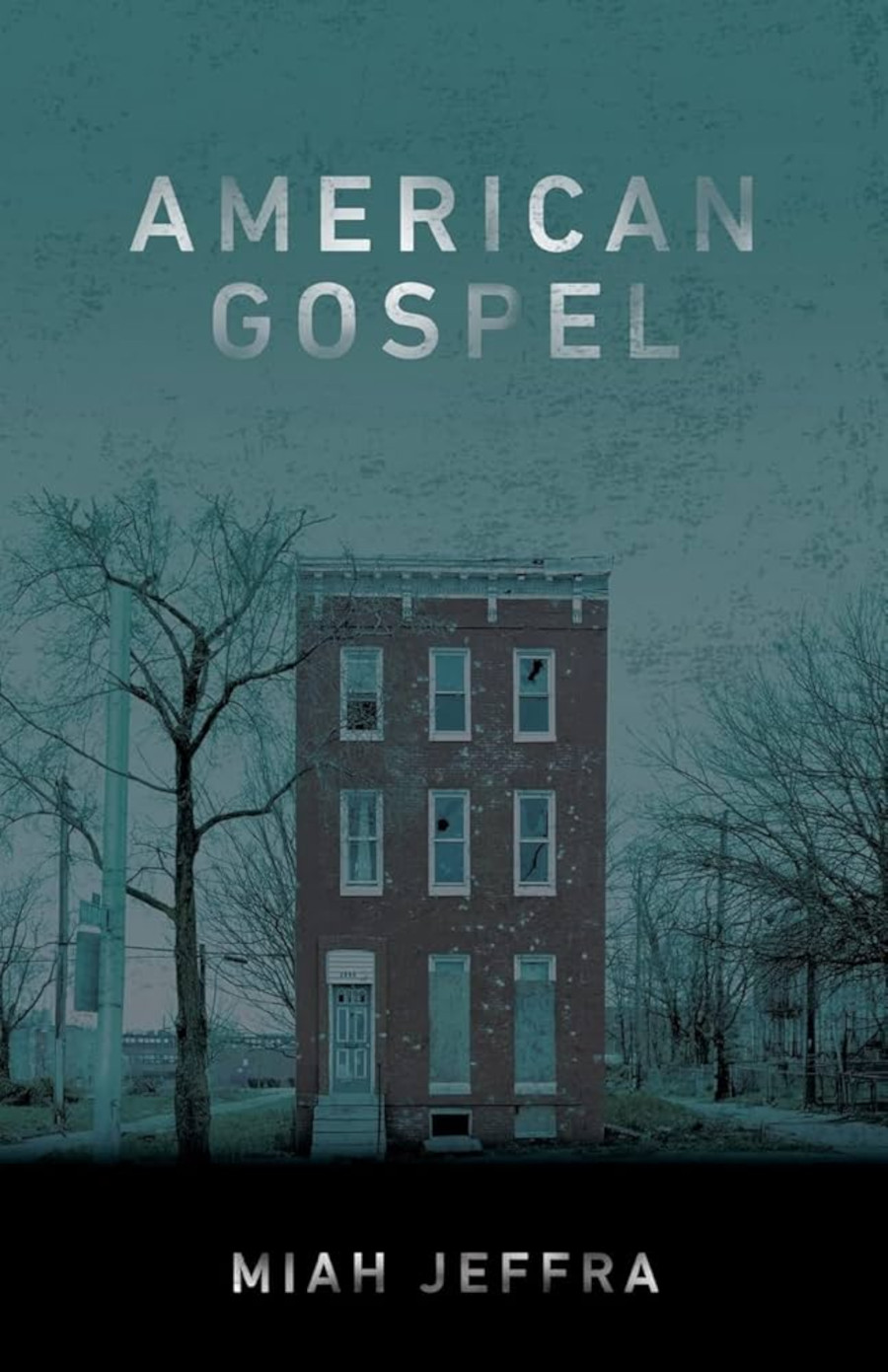
Miah Jeffra is a writer, artist, and former military brat hailing from the South. Their education centered upon Critical Studies in the Arts, and their work covers a spectrum of issues including class, gender structures, urban studies, oppressive race constructs, and more. Jeffra currently teaches writing and decolonial studies at Santa Clara and Sonoma State Universities. In their freshest novel, American Gospel, Jeffra presents the story of three individuals in Baltimore caught up in a city revivification drama: the plan is to demolish neighborhoods and replace them with a theme park called Crabtown. The narrative shifts point of view each chapter. It follows seventeen-year-old Peter as he explores his identity and navigates his role in society. It follows Peter’s mother and redheaded southern spitfire, Ruth Anne, as she grieves her eldest son Joby’s death, and manages crippling fears of her estranged abusive husband and Peter’s ensuing abandonment when he heads to college. And it follows Thomas, a Catholic Brother and history teacher at Peter’s school, who is quietly in love with Ruth and, as he approaches middle-age, is finally unpacking his true self, desires, and future.
American Gospel is a psychoanalytic case study, albeit fictitious. How and why does communication fail to foster connection? In what ways do core trauma and generational trauma impact society? Via mesmerizing lyricism, Jeffra answers these questions and reinforces the idea that what makes something deeply intimate and personal also makes it universal, and that we solve macro problems in micro moments.
Jeffra’s psychological realism serves to illustrate why we act the way we do—specifically, why we are so challenged in our interpersonal connections. Things unsaid leave Peter, Ruth, and Thomas isolated from those they love. So much could be clarified, if only the words were spoken. We witness this most acutely in Ruth. When Peter’s acceptance to Columbia University arrives in the mail, Ruth is concurrently coping with a relocation letter and the belief that her husband Isaac looms lethal. In her terror, she cannot force words out: “There is no air in me, I can’t even open my mouth to explain. The relocation letter. Isaac’s flower and no note. To have Peter understand. All of it is stuck way down my throat” (263).
But why is Ruth this way? Why can’t she let Peter in? These questions plagued me the entire novel until the end, when we see the role generational trauma has in shaping Ruth’s character. We’re left to speculate: if Ellwood Park is full of phantom wayward Jobys, how might Baltimore have been different if Ruth hadn’t experienced trauma of her own? What if, instead of biting her tongue, Ruth had spoken the words she needed to Joby—truly connected with Joby? Considering his intelligence, Joby might then have been self-assured and securely attached from the get-go, someone unafraid to embody his identity, speak plainly, and gather with like-minded souls. He might have more than survived—he might have been an agent of change. How about the million other Ruth’s mothers and subsequent Ruths across the globe, and all those potential Jobys saved? Just think of that reach!
To be sure, Peter isn’t wrong when he muses that “If desire ripens in the absence of language, then words kill it, make it rotten. Words, that attempt precision, yet never absolute, like science like religion, never in full agreement, always slightly askew from exact meaning. If desire ripens in the absence of language, then words kill it” (373). Language fails us in every way, every day. It is just a tool fashioned by humans; just like humans, it is imperfect.
Nevertheless, words are our broadest avenue for connection—and so we must try to obliterate barricades. We must speak.
In Jeffra’s representation of the phantom character Joby, and then Peter, as products of Ruth’s incapacity to vulnerably connect with her children (learned from her own mother), I see an acute understanding of how what begins in the modest confines of the family home plays out large over millennia, as those children become adults and have children of their own. We see the consequences on the news media daily via riots, violence, politics, tyranny, and war. This is the impact of generational trauma. This is how micro becomes macro, and if we want change to happen, we must reverse this process: what macro ills began with the micro must be healed in the micro. It’s Peter’s new friend, self-assured Max, whose group of peers (confident in their voices) meets, marches, and moves. Here lies our hope. Revolution begins with such individuals in small groups, protecting one building at a time. It also begins with Thomas’s tiny tremendous decision to gift his family home to a single mother in need, thus enhancing Little Italy’s flavor for the future. Small begets big.
When I was a young stay-at-home mom, people reassured my tumultuous mind, saying, “The most important work is accomplished at home.” It was nice to hear, but I thought they were full of shit. What was I doing to save the world? Wiping butts? Baking dino nuggets? Reading One Fish, Two Fish until my brain atrophied from understimulation? I both loved and hated that job. Mothering. But now I see. Jeffra’s American Gospel addresses issues of critical race theory, faith, gender and sexuality, extinction versus gentrification versus progress, in a manner so complex yet so well-defined that it could be taught in classrooms. Nevertheless, what I found within the text was evidence that great change, world change, has roots in the smallest moments of vulnerable, authentic connection between parent and child.




